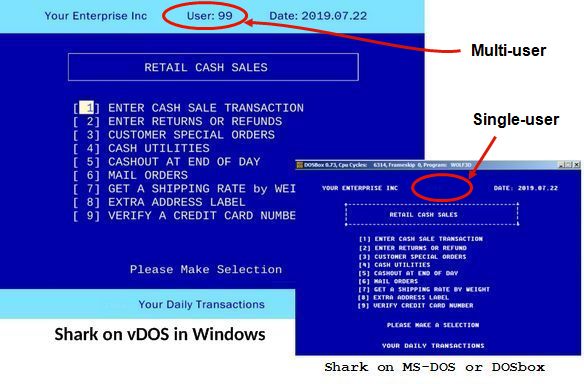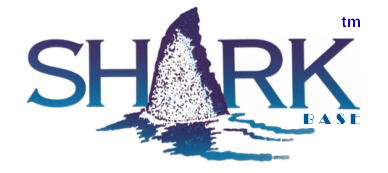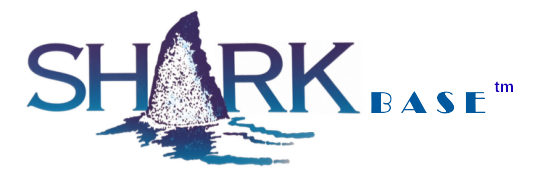The SharkBase dbf Language

Historical Notes:
Shark (originally developed as VP-Info for business-type applications) is a dbf language/compiler intended as a high-speed version of dBase. Built on a modern version of the dBase file system, Shark can be visualized these days as a simplified SQL language which runs on simple local servers. In other words, it's a sophisticated relational database, similar to dBase, Clipper, and FoxPro languages but capable of querying large, standard data files. Building on the earlier VP-Info and dBase idea, SharkBase was subsequently developed for writing applications for large statistics and accounting purposes. Although capable of handling billions of records, SharkBase is still efficient, quick, stable, and very powerful. Shark's dbf data files are 100% compatible with dBase & Clipper files, and also OpenOffice/LibreOffice spreadsheet files such as .odt/.xls type files. The programming syntax is similar to dBase, and vintage dBase programs can be ported to SharkBase easily. Shark is also multi-user, multitasking on modern Windows systems using vDOS or DOSbox-X emulators.
The question somestimes comes up: who actually invented SharkBase? Where did it start? The scientists who pulled it all together started with mathematicians David Clark and George Grätzer at the University of Manitoba with their idea for a fast,flexible database compiler that would work with standard database files such as were evolving at the time. One such evolutionary thread was VP-Info, the block-buster dBase compiler produced by Paperback Software in 1983. Grätzer is still widely known and respected for his contribution to the LaTeX math display language:

The result was a language called "dComp" which continued to evolve with contributions from many others, into its most recent iteration, SharkBase.
What is SharkBase?
SharkBase is a dBase/Clipper compatible language & compiler, able to read, write, import/export the other dbf file types. Files, indexes, and memos are dBase compatible. Shark dbf data files can be imported into Open/LibreOffice and into Microsoft Office. Shark is able to sort out the enormous and clumsy PayPal annual summary CSV reports, a huge benefit for businesses selling on PayPal! Shark also contains over 200 advanced math functions, making Shark most useful for large, complicated statistical applications. In general, Shark is able to handle bigger projects, much faster, and more easily, than its older dBase and Clipper siblings.
In 1990, Sub Rosa Publishing Inc released the latest iteration under the name SharkBasetm. The unstable Clipper indexes proved to be not as popular as the dBase indexes, and this latest version of SharkBase uses the newer, much improved dBase IV index capable of reading and writing any dBase file and index regardless of origin. Today, SharkBase with the latest ndx indexing is published by Specialized Clinical Software and can be purchased on this website.
The basic single-user version VP-Info with simple dBase II indexes is still available as a free download from many sources. The latest multi-user, multi-tasking version, SharkBase, with Shark's improved .ndx file indexing, and capable of reading any dbf file format, is available from this website. Both versions run on any version of Windows using any of several popular Windows-based emulators. The multi-user version of SharkBase (included in the download package), has the bonus feature of supporting multi-user record-locking which can be run on peer-to-peer Windows networks.
SharkBase can also run as a single-user app without Windows networking, exactly like VP-Info, but with all Shark's later advanced file and math abilities.
DOS/Windows emulators:

Although it's possible to still run Shark on MS-DOS, it's really not practical! It essentially runs better as a Windows application using a vDOS or DOSbox-X emulator. Both emulators are simple Windows extensions. Each calls and runs Shark with a 2-line command. Although both emulators run well with no surprises, vDOS is not as well-developed as recent releases of DOSbox-X, and has a few minor quirks. In an original MS-DOS setup, both Shark & VP-Info function normally, but with the slow speed and lower-quality MS-DOS display quirks as shown. Each environment handles print output differently: MS-DOS directs output to a device (LPT1, for example, which doesn't exist on a modern Windows or Linux PC) or to a text file. SHARK on a Windows or Linux emulator, on the other hand, is fast and stable.
What is DOSbox?
There's 3 emulators available, and you should be aware of the differences. vDOS and DOSbox-X are similar in origin, but there's also a basic plain-vanilla DOSbox, a single-user, single-tasking application for running DOS games. It's not suitable for business or scientific applications mainly because it's optimized for speed at the expense of security. In other words: it's great for games, but not a small manufacturer keeping track of invoices!

vDOS and DOSbox-X on the other hand, are intended to handle multi-user, multi-tasking business and scientific applications. DOSbox-X handles memory allocation automatically, and no memory tuning/adjusting is required. Since later versions of Windows don't print to a DOS device (e.g. "LPT1" or "COM1"), SHARK on vDOS automatically directs its output to a standard Windows text file or alternatively to any installed Windows printer. DOS output limitations are not a problem with Shark since the Shark output is directed to a simple ".txt" file which can be easily printed from Windows, or accessed by any Windows print applications to create, for example, .doc or .pdf files. Most DOS applications running on emulators are subject to MS-DOS "8+3" file name limitations. Long files names can be installed using after-market tools if needed, but most users can easily work within the file-name limitations.
Shark's output files are automatically handled by Windows; the tools for formatting Shark PRINTED output come with the introductory DOSbox-X files packages. Output files are directed by your Shark program and are transparent to the end-user. (NOTE: DOSbox-X is upated annually by the DOSbox-X developers and the basic package is a free download. Licenced versions of vDOS are available for commercial use. However, without paying for a licence, vDOS shows an annoying pop-up nag-note which appears every 10 minutes. DOSbox-X is open-source at GitHub, with lots of good tech support and no licence fee. Either can be used as a single or networked installation.
Who Uses SharkBase?
The answer is: anyone who runs small manufacturing, service, or scientific operations where their usual suite of Windows applications needs to be supplemented with additional specialized management tools for handling costing, invoicing, purchasing, sales-analysis, payments, sales taxes and so on. SharkBase programs are much more pleasant to work with than slow and tedious spreadsheets! The possibilities are endless!

